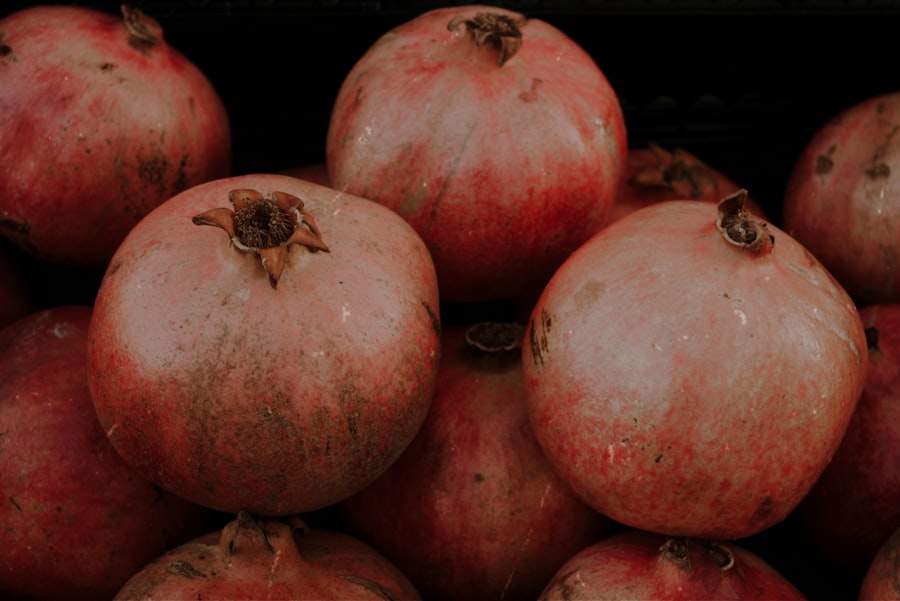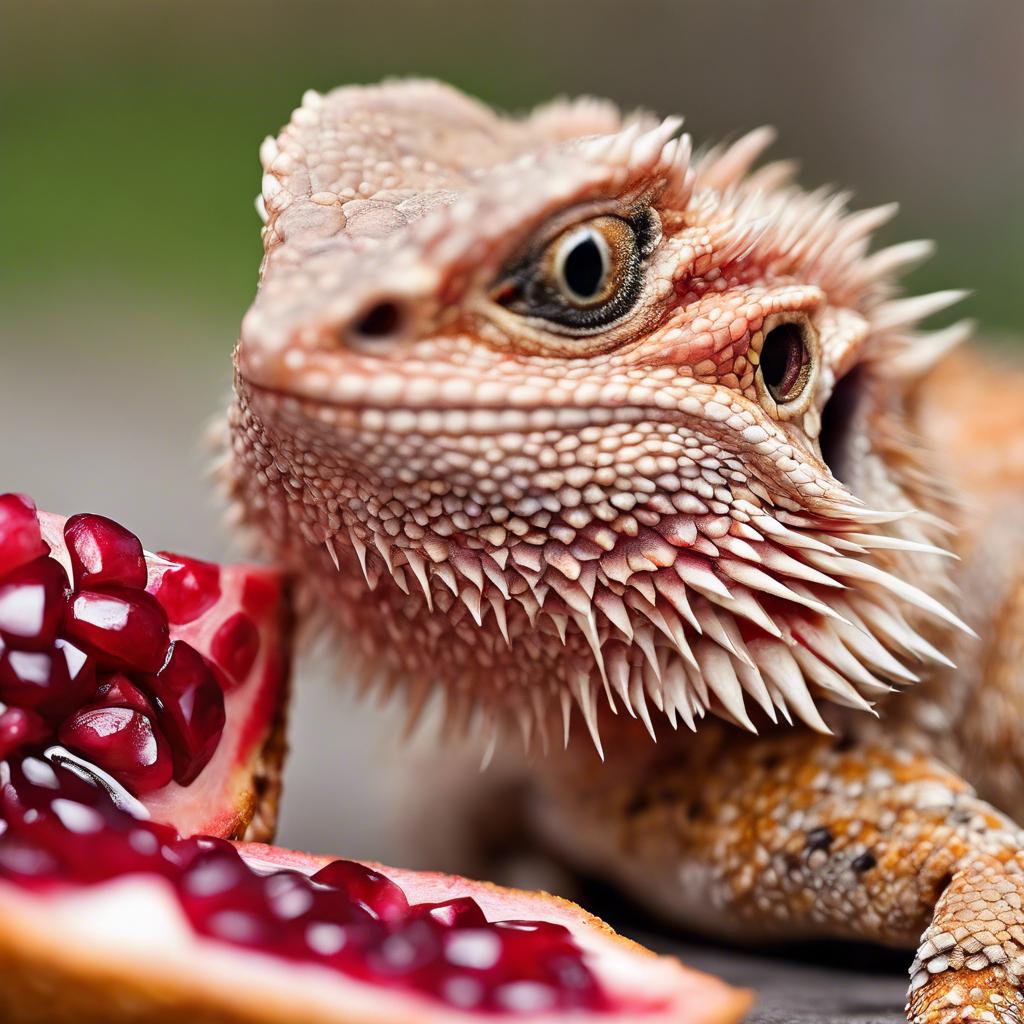Bearded dragons are popular reptile pets known for their unique appearance and docile nature. These lizards are native to Australia and have become increasingly popular as pets due to their calm temperament and relatively low maintenance requirements. However, like any pet, it is important to provide them with proper nutrition to ensure their overall health and well-being.
Proper nutrition is crucial for bearded dragons as it directly impacts their growth, development, and overall health. In the wild, bearded dragons have a varied diet consisting of insects, vegetables, and fruits. As pets, it is important to replicate this balanced diet to ensure they receive all the necessary nutrients they need to thrive.
Key Takeaways
- Bearded dragons require a balanced diet of protein, vegetables, and fruits.
- Pomegranate is a nutritious fruit that can benefit bearded dragons by providing antioxidants and vitamins.
- Feeding too much pomegranate to bearded dragons can lead to digestive issues and diarrhea.
- Pomegranate should be prepared by removing the seeds and cutting it into small pieces.
- Bearded dragons can also eat other fruits such as apples, berries, and mangoes, but in moderation.
Nutritional Requirements of Bearded Dragons
Bearded dragons require a balanced diet that includes a variety of food groups. These include protein-rich insects such as crickets and mealworms, leafy greens and vegetables for fiber and vitamins, and fruits for additional nutrients and hydration. It is important to note that the ratio of these food groups may vary depending on the age and size of the bearded dragon.
One crucial aspect of their diet is the inclusion of calcium and vitamin D3. Calcium is essential for bone health and proper muscle function, while vitamin D3 helps with calcium absorption. Without adequate levels of calcium and vitamin D3, bearded dragons can develop metabolic bone disease, which can lead to weak bones, deformities, and even death.
Benefits of Pomegranate for Bearded Dragons
Pomegranate is a fruit that can provide several health benefits for bearded dragons when offered in moderation. Pomegranates are rich in vitamins C and K, which are important for immune function and blood clotting respectively. They also contain antioxidants that can help reduce inflammation and promote overall health.
Additionally, pomegranates are a good source of hydration for bearded dragons due to their high water content. This can be particularly beneficial during hot weather or if the bearded dragon is experiencing dehydration.
Risks of Feeding Pomegranate to Bearded Dragons
While pomegranate can provide several health benefits, it is important to be aware of the potential risks associated with feeding too much pomegranate to bearded dragons. Pomegranates are high in sugar, and excessive sugar intake can lead to obesity, diabetes, and other health issues in bearded dragons.
Another potential risk is the presence of seeds in pomegranates. Bearded dragons should not consume seeds as they can cause digestive issues and potentially lead to impaction, a serious condition where the digestive system becomes blocked.
To avoid these risks, it is important to offer pomegranate in moderation and remove any seeds before feeding it to your bearded dragon.
How to Prepare Pomegranate for Bearded Dragons
To prepare pomegranate for bearded dragons, start by cutting the fruit in half. Hold one half over a bowl with the cut side facing down and gently tap the back of it with a spoon. This will help release the seeds, which will fall into the bowl. Repeat this process with the other half.
Once you have collected the seeds, you can offer them to your bearded dragon. It is important to remove any remaining white pith as it can be difficult for them to digest.
To make it easier for your bearded dragon to eat, you can also mash or blend the seeds into a pulp. This will make it easier for them to consume and digest.
Portion Control for Bearded Dragons

When offering pomegranate or any other fruit to your bearded dragon, it is important to practice portion control. Fruits should only make up a small portion of their overall diet, with the majority consisting of protein-rich insects and leafy greens.
A good rule of thumb is to offer fruits as a treat or occasional addition to their diet, rather than a staple food. This will help ensure they receive a balanced diet and do not consume excessive amounts of sugar.
Frequency of Offering Pomegranate to Bearded Dragons
The frequency of offering pomegranate to bearded dragons will depend on their individual needs and preferences. Some bearded dragons may enjoy pomegranate and readily consume it, while others may not show much interest.
As mentioned earlier, pomegranate should be offered in moderation as a treat or occasional addition to their diet. It is important to monitor their intake and adjust accordingly to prevent overconsumption of sugar.
Other Fruits that Bearded Dragons Can Eat
In addition to pomegranate, there are several other fruits that bearded dragons can safely consume. These include:
1. Apples: Apples are a good source of vitamins A and C, as well as fiber. They should be offered in small, bite-sized pieces without the seeds or core.
2. Berries: Berries such as strawberries, blueberries, and raspberries are rich in antioxidants and vitamins. They can be offered whole or mashed for easier consumption.
3. Melons: Watermelon and cantaloupe are hydrating fruits that can provide additional moisture for bearded dragons. Remove the seeds and rind before offering them.
4. Mangoes: Mangoes are a good source of vitamins A and C, as well as fiber. Offer them in small, bite-sized pieces without the skin or pit.
It is important to note that while these fruits are safe for bearded dragons, they should still be offered in moderation and as part of a balanced diet.
Bearded Dragon Care Tips
In addition to providing a balanced diet, there are several other care tips that can help ensure the health and well-being of your bearded dragon:
1. Provide a suitable habitat: Bearded dragons require a spacious enclosure with proper lighting, heating, and humidity levels. The enclosure should also include hiding spots, basking areas, and a shallow water dish for drinking and soaking.
2. Maintain proper temperatures: Bearded dragons are ectothermic, which means they rely on external heat sources to regulate their body temperature. Provide a temperature gradient in their enclosure, with a basking spot of around 95-105°F (35-40°C) and a cooler side of around 75-85°F (24-29°C).
3. Offer a variety of insects: In addition to pomegranate and other fruits, bearded dragons require a variety of protein-rich insects in their diet. Crickets, mealworms, and dubia roaches are commonly offered as staple insect options.
4. Regular vet check-ups: It is important to schedule regular check-ups with a reptile veterinarian to ensure your bearded dragon is in good health. They can provide guidance on diet, habitat setup, and any potential health concerns.
Can Bearded Dragons Eat Pomegranate?
In conclusion, pomegranate can be offered to bearded dragons as part of a balanced diet. It provides several health benefits due to its nutritional value and high water content. However, it is important to practice portion control and avoid overfeeding pomegranate or any other fruit to prevent excessive sugar intake.
Remember to remove any seeds before offering pomegranate to your bearded dragon, as they can cause digestive issues. Additionally, it is important to offer a variety of other foods such as protein-rich insects and leafy greens to ensure they receive all the necessary nutrients for optimal health.
By providing a balanced diet, proper care, and regular vet check-ups, you can ensure that your bearded dragon remains healthy and happy for years to come.
If you're wondering whether bearded dragons can eat pomegranate, you'll find the answer in this informative article from Reptile Wizard. Packed with valuable information about reptile keeping, this article explores the topic of what foods are safe for bearded dragons. From fruits and vegetables to insects and more, it covers a wide range of dietary options for these fascinating creatures. To learn more about whether pomegranate is a suitable addition to your bearded dragon's diet, check out the article here: Can Bearded Dragons Eat Pomegranate?
FAQs
What is a bearded dragon?
A bearded dragon is a type of lizard that is native to Australia. They are popular pets due to their docile nature and unique appearance.
What is a pomegranate?
A pomegranate is a fruit that is native to the Middle East. It is known for its juicy, red seeds and sweet-tart flavor.
Can bearded dragons eat pomegranate?
Yes, bearded dragons can eat pomegranate in moderation. It is important to remove the seeds and only feed them the flesh of the fruit.
Why should bearded dragons only eat the flesh of the pomegranate?
The seeds of the pomegranate can be difficult for bearded dragons to digest and may cause digestive issues. Additionally, the seeds can be a choking hazard.
What are the nutritional benefits of feeding bearded dragons pomegranate?
Pomegranate is a good source of vitamin C, which can help boost the immune system of bearded dragons. It also contains antioxidants and fiber.
How often should bearded dragons be fed pomegranate?
Pomegranate should only be fed to bearded dragons as an occasional treat. It should not make up a significant portion of their diet.

